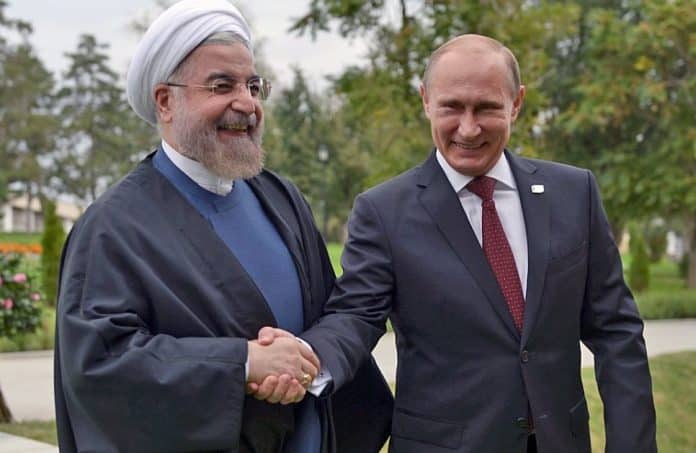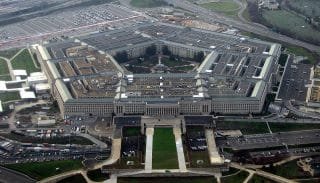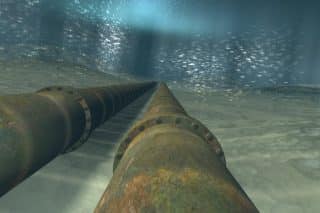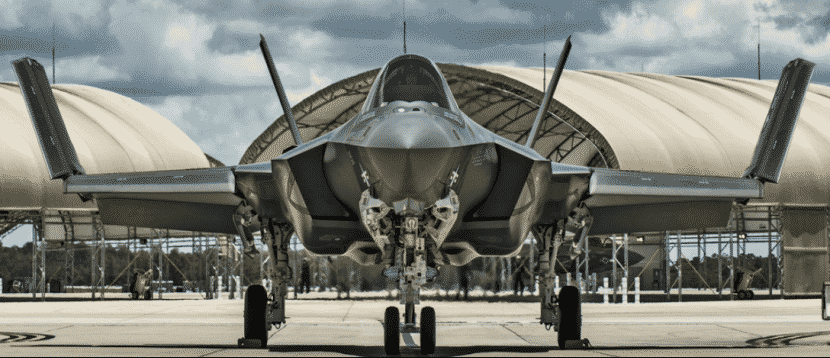Editor’s Note: William Engdahl gives us a good review and updates on the boomerang effects of America’s failed aggressive foreign policy. Instead of making us more secure, it has triggered waves of insecurity all over the world, with huge civilian casualties and destruction.
There is even a darker side to it. By that, I mean that maybe it isn’t really a failed foreign policy at all. Forcing all of these targeted countries to speed up the process of integrating themselves militarily might be exactly what our policy was designed to do.
And the reason why revolves around its creating the need for an expanded military presence, which we saw happen with the Asian Pivot, and the more recent Ukraine move to push NATO and our offensive and defensive missiles closer to the Russian border.
The most recent military chiefs’ Congressional hearing presented the “growing military threats” term, as this concept emerged from the closet, once again, to start acclimating the public to it.
This allows the military-industrial complex to play the fear porn card more easily, as they try to leverage the need for expanded military expenditures when we obviously have no one who can really threaten us. We have shelled out more red-ink bucks to defend ourselves from threats that we have purposely created. With defenders like this, who needs enemies?
This habit is nothing more than an attack on America from those sworn to protect us. It’s almost like they have watched the mortgage banking scandal, and Wall Street’s unrestricted derivatives trading mega thefts — all with no prosecutions — and felt they were missing out on the action and had to play catch up with their own devious manipulations.
We at VT are still waiting for someone to brief us on the reality of the threat verbiage that we see constantly bandied about for public consumption.
So far not one official seems up to the task, as they know what our response will be if they sling a lot of cow poop at us. We will sling it right back.
So they hunker down and stay on message and ignore any questions they feel are pathways to unmasking their true intentions.
If there were legitimate threats, such tactics would not be used. So that is a dead giveaway that they know they can’t really defend the policy, except for controlled environments like a rigged Congressional hearing.
As I have editorialized for some years, we have a leadership crisis, not only in the world as a whole, but right here at home. It is even worse, in that this bankrupt leadership is the most dangerous threat we face.
They are in our midst and in our pocketbooks. Hence we see the “Israeli method” being used on us, creating bogeymen threats around the world — most of those created by our own and related rogue operators… Jim W. Dean
– First published … February 22, 2015 –
by F. William Engdahl with New Eastern Outlook, Moscow
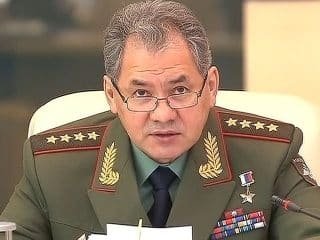
The dynamics of Russian foreign policy since the USA has forced a de facto declaration of war via financial and economic sanctions against Russia is impressive to put it mildly.
Whether it will suffice to break the economic siege of Washington and open the way for a genuine global economic alternative to the bankrupt US Dollar System is not yet clear.
What is clear is that Vladimir Putin and the faction of industrial barons who have decided to back him are not cowering in fear.
The latest example is the recent visit of the Russian Defense Minister to Tehran, to do major military cooperation deals with Iran. The implications for both countries, as well as the future of Eurasia, are potentially huge.
On January 20 in Tehran, Russia and Iran signed an agreement on military cooperation. Russian Defense Minister Sergei Shoigu and Iranian Defense and Armed Forces Logistics Minister Hossein Dehghan signed the new agreement. Remarking on its significance, Shoigu stated, “A theoretic base of cooperation in the military sphere has been created.”
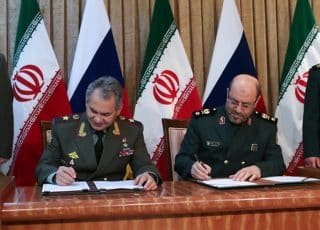
He added that the two countries have agreed on “bilateral cooperation in practical regards and to promote an increase in the military capabilities of the armed forces of our countries.”
The two also agreed on “the importance of the need to develop Russia and Iran’s cooperation in the joint struggle against meddling in the affairs of the region by external forces that are not part of it was framed,” Iranian Defense Minister Dehghan declared.
To make sure no one mistook who he meant, he added that the reason for aggravation in the situation of the region was a US policy that “meddles in the domestic affairs of other countries.”
The coming closer of the two Eurasian countries, both bordering the strategic Caspian Sea, has enormous implications for global geopolitics. The Obama Administration has tried to woo Iran in a stick (economic sanctions) and carrot (promise of lifting same) manner over the past eighteen months to get Tehran to agree on major concessions on her nuclear program.
Until recently, despite US sanctions over Ukraine, Russia was willing to show “good faith” to Washington by participating in the 5-1 nuclear negotiations with Iran to persuade Tehran to make major concessions on its nuclear program — one where Russia built the just-completed Bushehr nuclear power plant, the first in the Middle East.
That phase is clearly over and Iran’s hand in the negotiations with the US, France, Germany, UK has just got stronger, sanctions or not.
___________________________________
Iran, Syria and Pipeline Wars
For Washington, the nuclear pressure is part of an attempt to force Iran to abandon her ally, Bashar al-Assad in Syria, in order to open the way for Qatar, a close ally of Saudi Arabia and site of the world’s largest natural gas field in the Persian Gulf.
Qatar, which has been the prime funder of the US and Israeli-trained ISIS terrorists in Syria and Iraq, wants to export its gas to the EU via Syria and Turkey.
Iran, which holds the other part of that huge Persian Gulf gas field, North Pars, in its offshore waters, signed a strategic pipeline deal with Assad and Iraq in June 2011 to build a new Iran-Iraq-Syria gas pipeline for 1500 kilometers from their chunk of the world’s largest gas field going from Asaluyeh, the Iranian port near the South Pars gas field, to Damascus in Syria.
From there the pipeline would go via Lebanon to the eastern Mediterranean and on to the huge EU gas market. They named it the “Islamic Pipeline.”
The volume of Iran gas would be modest compared to Russia’s Gazprom original South Stream pipeline.

An estimated 20 billion cubic meters per year would remain after local consumption requirements (pre-Syria war) from that Iran-Iraq-Syria pipeline, for Europe, compared to the 63 billion from the South Stream.
Qatar would be the loser. Qatar, a Sunni Islam country that finances ISIS, as well as the Muslim Brotherhood and other such charming Jihadists, doesn’t like the idea.
Qatar approached Assad in 2009 to propose a Qatar-Syria pipeline to the EU via Turkey, but was turned down flat. Assad said his relations with Russia and Gazprom were more important.
It was at the time of the Iran-Iraq-Syria Islamic Pipeline signing in June 2011 that Washington, Saudi Arabia and Qatar decided to launch a full-scale war to topple Assad and replace him with a Sunni regime friendly to Qatar and Washington… Hardly a coincidence.
___________________________________
Closer Iran-Russia military ties
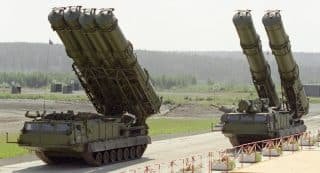
Today, Putin’s Russia and Iran are the two steadfast allies of Syria’s Assad in his war to rid Syria of US-trained ISIS terrorists. However, the collaboration between Moscow and Tehran has been cautious until now.
In 2010 when he was President responsible for Russian foreign and defense policies under the Constitution, Dmitry Medvedev made many conciliatory moves to get on Washington’s “good side.” That was the era of Hillary Clinton’s silly “reset” in US-Russia relations after Putin then had left and Obama was newly-inaugurated as a “peace Democrat.”
One of the most costly moves Medvedev made was his signing a Presidential decree in September 2010 to support a US-sponsored UN ban on sales of all weapons to Iran as part of US sanctions against Iran’s alleged nuclear weapons program.
The ban cost Russian military industries as much as $13 billion in military-technical sales to Iran over the past several years according to an estimate by the Center for Analysis of World Arms Trade (CAWAT).
Medvedev’s decree banned all military sales from Russia to Iran and included the transfer of weapons to Iran from outside the borders of Russia by aircraft or vessels operating under the Russian state flag.
Medvedev also retroactively annulled Iran’s pre-paid purchase of sophisticated Russian S-300 Surface to Air SAM missile systems. Iran then sued Russia’s state Rosoboronexport at the OSCE Court of Conciliation and Arbitration in Geneva.
To date the S-300 issue had been a major bone of contention between Tehran and Moscow. Now, according to a report in DebkaFile.com, a website reportedly linked to Israeli intelligence, Russia has agreed not only to deliver the S-300 SAM missile systems Iran bought back in 2007. Russia will also deliver S-400 advanced missile systems to Iran.
They quote the Iranian defense ministry, “The two countries have decided to settle the S-300s problem.” Col. Gen. Leonid Ivashov, a former Russian Defense Ministry official, added: “A step was taken in the direction of cooperation on the economy and arms technology, at least for such defensive systems as the S-300 and S-400.”
Military specialists say the S-400 is vastly superior to the US PAC-3 Patriot missile. It’s believed to be the first system in the world that can selectively use several types of missiles, both previously developed SAMs and the new, unique SAMs. It is mobile, making detection difficult.
It can target Strategic bombers such as the B-1, FB-111 and B-52H; Electronic warfare airplanes such as the EF-111A and EA-6; Reconnaissance airplanes such as the TR-1; Early-warning radar airplanes such as the E-3A and E-2C; Fighter airplanes such as the F-15, F-16; Stealth airplanes such as the B-2 and F-117A; Strategic cruise missiles such as the Tomahawk; Ballistic missiles in a range up to 3,500 km.
Furthermore, the Pentagon’s most colossal weapon boondoggle to date, the Lockheed Martin F-35 Joint Strike Fighter, was not designed to penetrate the coverage of the S-300P/S-400 systems. Oops…
The US F-35 is a nuclear-capable weapon of mass destruction, supposed to be the “fighter of the future” when it was begun in 2001 in the Rumsfeld Pentagon days. It’s a decade overdue, 100% over budget, and expected to cost $1.5 trillion over its useful life, of which about $400 billion has already been spent. Obama’s mandatory defense cuts under “sequestration” took a knife to the F-35 plans and other Pentagon pork barrel projects only two years ago.
Now, using ISIS in Syria and Iraq and the “conflict” in Ukraine with Russia, Obama’s latest Defense Budget calls for exceeding by $35 billion the mandatory across-the-board reductions of sequestration. The Ukraine and ISIS crises seem to have rescued the US military industrial complex in the nick of time…
If the DebkaFile report about S-400 missile system to Iran is true, and it certainly seems to be, then the geopolitics of the entire battle between the Obama Administration and Russia and Iran and Syria, and soon China, is indeed very stupid.
The battle is being led by tunnel-vision warhawks around President Obama such as NSC Adviser Susan Rice. They seem incapable of grasping connections between events, and are, thus, by definition, not intelligent people. It is being led by the US military industrial complex, prominently by Lockheed Martin, main contractor of the disastrous F-35.
It is being led by a rich, power-addicted Oligarchy that somehow thinks they own the world. In fact, as recent events testify, they are losing the world they thought they controlled by their stupidity. Some call it the law of unintended consequences.
F. William Engdahl is strategic risk consultant and lecturer, he holds a degree in politics from Princeton University and is a best-selling author on oil and geopolitics, exclusively for the online magazine “New Eastern Outlook”.

Frederick William Engdahl (born August 9, 1944) is an American writer, economics researcher, historian, and freelance journalist.
He is the author of the best-selling book on oil and geopolitics, A Century of War: Anglo-American Oil Politics and the New World Order. It has been published as well in French, German, Chinese, Russian, Czech, Korean, Turkish, Croatian, Slovenian, and Arabic. In 2010 he published Gods of Money: Wall Street and the Death of the American Century, completing his trilogy on the power of oil, food, and money control.
Mr. Engdahl is one of the more widely discussed analysts of current political and economic developments, and his provocative articles and analyses have appeared in numerous newspapers and magazines and well-known international websites. In addition to discussing oil geopolitics and energy issues, he has written on issues of agriculture, GATT, WTO, IMF, energy, politics, and economics for more than 30 years, beginning the first oil shock and world grain crisis in the early 1970s. His book, ‘Seeds of Destruction: The Hidden Agenda of Genetic Manipulation has been translated into eight languages. A new book, Full Spectrum Dominance: Totalitarian Democracy in the New World Order describes the American military power projection in terms of geopolitical strategy. He won a ‘Project Censored Award’ for Top Censored Stories for 2007-08.
Mr. Engdahl has lectured in economics at the Rhein-Main University in Germany and is a Visiting Professor in Economics at Beijing University of Chemical Technology.
After a degree in politics from Princeton University (USA), and graduate study in comparative economics at the University of Stockholm, he worked as an independent economist and research journalist in New York and later in Europe, covering subjects including the politics of energy policy in the USA and worldwide; GATT Uruguay Round trade talks, EU food policies, the grain trade monopoly, IMF policy, Third World debt issues, hedge funds, and the Asia crisis.
Engdahl contributes regularly to a number of international publications on economics and political affairs including Asia Times, FinancialSense.com, 321.gold.com, The Real News, Russia Today TV, Asia Inc., GlobalResearch.com, Japan’s Nihon Keizai Shimbun, Foresight magazine. He has been a frequent contributor to the New York Grant’sInvestor.com, European Banker and Business Banker International and Freitag and ZeitFragen in Germany, Globus in Croatia. He has been interviewed on various geopolitical topics on numerous international TV and radio programs including Al Jazeera, CCTV and Sina.com (China), CCTV (China) Korea Broadcasting System (KBS), and RT Russian TV. He is a Research Associate of Michel Chossudovsky’s well-respected Centre for Research on Globalization in Montreal, Canada, and a member of the editorial board of Eurasia magazine.
Mr. Engdahl has been a featured speaker at numerous international conferences on geopolitical, GMO, economic, and energy subjects. Among them is the Ministry of Science and Technology Conference on Alternative Energy, Beijing; London Centre for Energy Policy Studies of Hon. Sheikh Zaki Yamani; Turkish-Eurasian Business Council of Istanbul, Global Investors’ Forum (GIF) Montreaux Switzerland; Bank Negara Indonesia; the Russian Institute of Strategic Studies; the Chinese Ministry of Science and Technology (MOST), Croatian Chamber of Commerce and Economics.
He currently lives in Germany and, in addition to teaching and writing regularly on issues of international political economy and geopolitics, food security, economics, energy, and international affairs, is active as a consulting political risk economist for major European banks and private investors. A sample of his writings is available at Oil Geopolitics.net
ATTENTION READERS
We See The World From All Sides and Want YOU To Be Fully InformedIn fact, intentional disinformation is a disgraceful scourge in media today. So to assuage any possible errant incorrect information posted herein, we strongly encourage you to seek corroboration from other non-VT sources before forming an educated opinion.
About VT - Policies & Disclosures - Comment Policy

